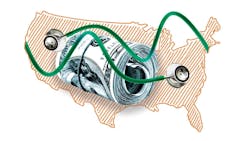$5 billion in PPP loans granted in first week; NAMA highlights key parts of stimulus
The latest small-business relief package, part of the overall $900 billion stimulus bill signed by President Trump in December, is starting to flow. The second stimulus pandemic package includes two priorities sought by the National Automatic Merchandising Association: a new round of Paycheck Protection Program loans and an extension of the CARES Act’s Employee Retention Tax Credit.
PPP Update
The bill includes $284 billion for the second PPP round. The U.S. Small Business Administration approved more than $5 billion in new PPP loans in the first week after the program reopened Jan. 11; that’s for more than 60,000 loans.
“The most significant development in the legislation for small businesses is a second round of PPP loans,” NAMA’s government affairs team said. The loan limit is $2 million, NAMA explained, and the amount a small business will qualify for is determined by taking its average monthly payroll in 2019 and multiplying it by 2.5; in other words, a PPP loan is meant to fund 2.5 months of payroll expenses.
Employee Retention Tax Credit
According to NAMA, employers who receive a PPP loan could still qualify for the Employee Retention Tax Credit in regard to wages not paid with forgiven PPP loans. The new bill increases the limit on per-employee creditable wages from $10,000 for the year to $10,000
for each quarter. And it increases the credit rate from 50% to 70% of qualified wages.
It also expands eligibility by reducing the required year over year decline in gross receipts from 50% to 20%. In addition, the new ERTC section increases the 100 employee delineation for “large employers” for determining the relevant qualified wage base to employers with 500 or fewer employees.
Economic Injury Disaster Loans
In the new bill, $20 billion was added to the EIDL Program, NAMA said. EIDL loans provide eligible applicants with favorable 30-year loans accompanied by forgivable grants, as an advance, of up to $10,000. Payments on these loans are deferred for a year. To qualify, a company must have 500 or fewer employees and demonstrate a working capital loss due to Covid-19
For more information, visit namanow.org. And NAMA’s Action Center can help operators contact their state representatives.
